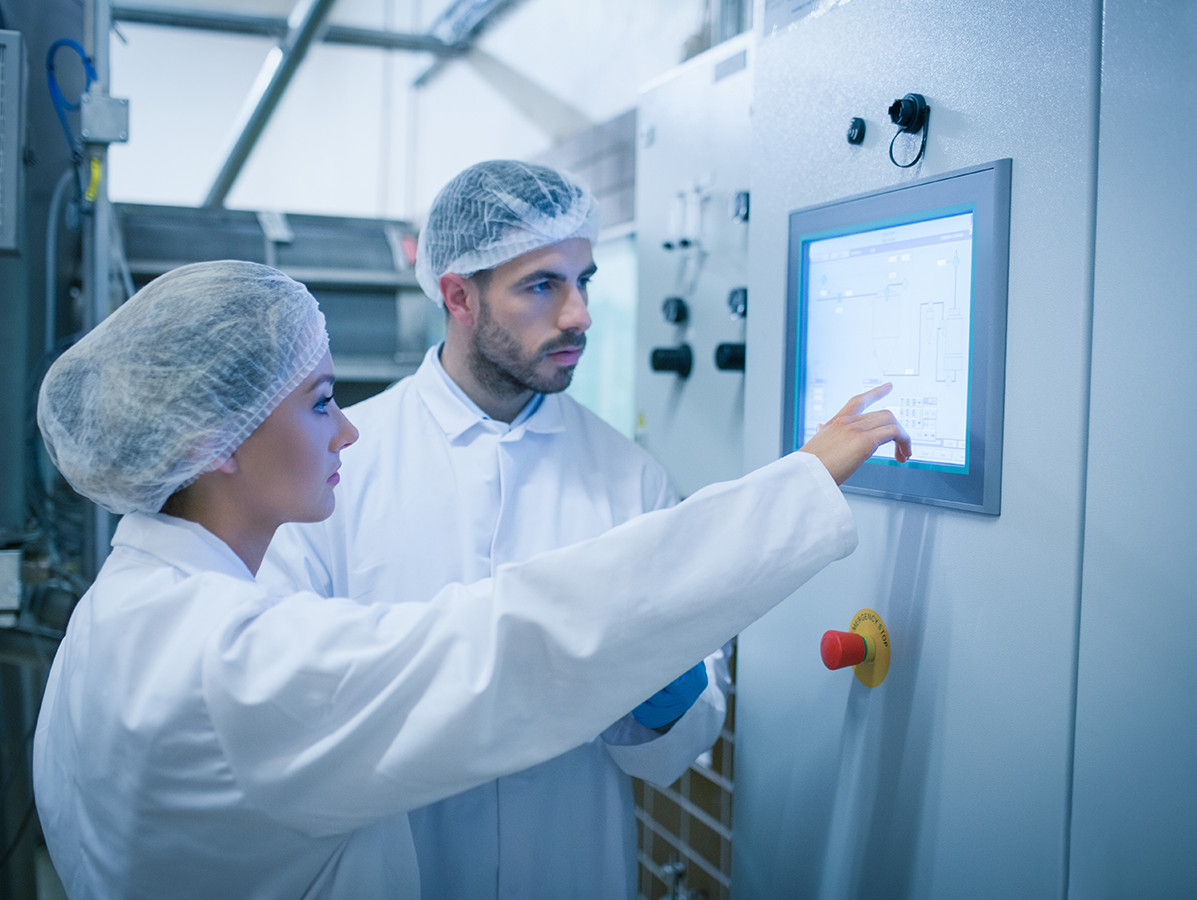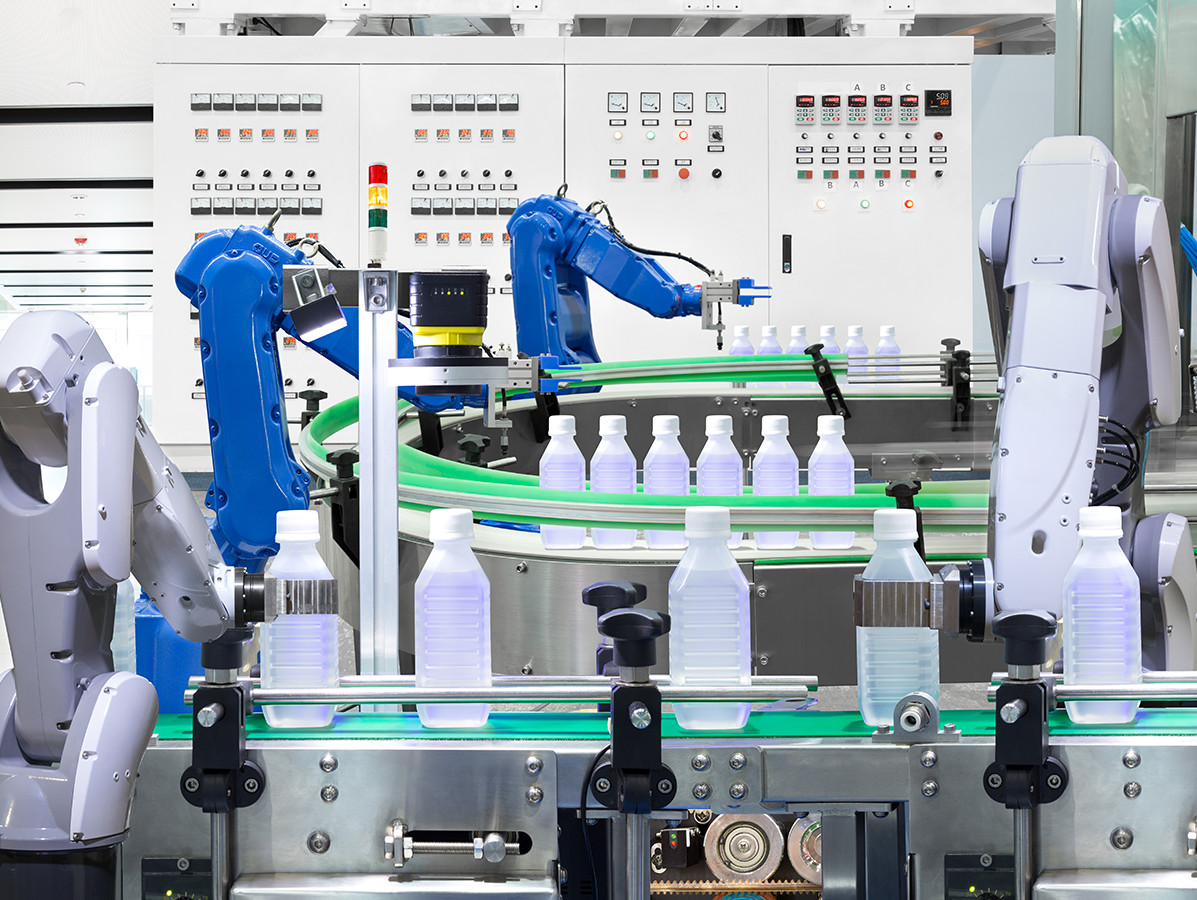
The food processing industry is becoming increasingly 'smarter': thanks to automation processes and new techniques. What does this mean for the work floor? What is the industry up against, what solutions are being offered and where is it going? Four experts talk about the hardware, the software and the employees.
For a long time, the food industry lagged behind other industries when it came to automation and robotization processes. However, the industry has been catching up for some years now. The result: less manual work. What are the innovations in the coming years and what will change within the next 5 to 10 years? We asked:
Huub Sleegers, director/owner of Sleegers Technique BV; Roy Meenderink, Commercial Director Automation at RBK Group; Jan Zwaan, Director ESPERA-NEDERLAND B.V.; and Petra Goverts, education manager North-West SVO Vakopleiding Food.
Huub Sleegers immediately starts with a recent practical example: "Recently we were asked to innovate and automate a bacon line. Simple tasks, such as monitoring the dimensions, the meat/fat ratio and the colour, are now performed using camera techniques where every slice of bacon is scanned. In short: technical innovations overtake the human eye. As a result, 'silly' and boring work disappears."
Roy Meenderink responds: "Food companies want more and faster insight into their production, so that there is a clear view of the yield and therefore fewer wastage takes place, which helps to prevent food waste. Repetitive activities in production are increasingly being replaced by the use of cobots (collaborative robots, ed.). This can lead to cost savings. The need for robotisation is related to the fact that production workers are more difficult to find, although it is essential to be able to control the cobots from a central location; people with the right knowledge will therefore always be needed. So let's make sure that employees receive the right training and that we are able to hold on to them".
Petra Goverts: "What also plays a role in the reduced demand for people on the work floor is that suppliers often offer their own service technicians.
"Right", says Huub Sleegers: "This trend to a shift towards service-oriented technology has already started: as a special machine builder, we are becoming more and more an extension of the technical services of production companies. Organized maintenance is what we like to call it."
Jan Zwaan expects predictive maintenance to make a solid advance: "Sensors already indicate at what time certain machine components need to be replaced. This will help to prevent downtime of a machine park.
Machines are becoming more and more sophisticated and specific; also at Espera. Jan Zwaan says that increasing attention to other forms of fresh food packaging (saving materials and making it easier to recycle) is leading to all kinds of changes in packaging machines. "There are shorter production runs of fresh produce, with a lot of variation in packaging and labelling. Producers have to comply with stricter legal requirements, such as rules on allergens, origin and ingredient declarations. This is a challenge; also for the machinery. For weighing and labelling, for example, we have various innovative label applicators to enable us to label irregular geometries. We also offer robotisation and quick-change systems for label rolls, which simplifies frequent changes. New software tools and links simplify data management. Avoiding errors is essential, because producers want 100% control. This is possible with our vision systems that quickly detect errors so that they can be removed from the production line".
"Quality, safety and traceability of food are indeed of increasing importance," says Petra Goverts. "There is more demand for the higher levels within the secondary vocational education (mbo) in those areas. And operators who are still directly working at the production line also need to be higher educated more often: IT specialists are in great demand. I expect that in the future there will mainly be demand for people who are able to oversee a process, rather than just being a link in the chain. Communication skills have become more important in this respect. Are you able to motivate people, as well as appeal to them? Are you able to comply with rules of conduct together with your colleagues? Lifelong development and sustainable employability are therefore topics within SVO. We develop new curricula, which can be used as retraining. The goal: to ensure that employees working in the food sector remain vital, skilled and agile throughout their working lives. And then the language: it is an illusion to expect us to work with Dutch employees only. We believe that, despite robotisation and automation, the demand for personnel remains high. In the food industry, foreign employees play an essential role, also in the future. That is why we offer secondary vocational education (MBO) courses with an intensive language component; with a good intake and a high success rate for non-Dutch-speaking employees".

Jan Zwaan expects more and more 'pay per pack': from ownership to use, where a machine does not have to be purchased. "Modular machine fleets will also increase in the future: no longer the same shape for 20 years, but much more possibilities for interim adjustments. We make extensive customer analyses in several countries, in order to be able to identify and predict future developments. We also work closely together with (knowledge) institutes and invest heavily in R&D, to develop machine generations that meet future demand and can be modified in a modular way if demand changes again".
We are in constant contact with industry trendsetters, because the companies we do business with all want to be at the lead," says Huub Sleegers. "The bar is extremely high and is constantly being raised. I estimate that in 5 years' time about 95 percent of the production processes will be automated. Instead of many people in the factory, there will only be a few left. Above all, they will have to have a helicopter view. That requires a different intellectual capacity. We need more Gyro Gearlooses."
SVO realizes that. "This is one of the reasons why we want to work more closely with the industry over the next few years in the full-time food education programmes," emphasises Petra Goverts. "In one of the four educational blocks, we will focus on the content of the sector in order to introduce full-time students to what the food industry has to offer and what they are asking for. Involvement of companies in education is important for the future. For them, too, today's demand is not automatically tomorrow's demand. By means of choice, we anticipate developments in the sector, such as PLC control, communication and quality. Students work in an electronic learning environment (ELE). Digital skills are also being developed in this manner. We intend to make more use of virtual reality in education. Recordings were recently made of the cold store in Houten. Beautiful and less beautiful fresh products are placed in both correct and questionable locations in the cold store. This allows you to study the do's and don'ts of storage."
What about Industry 4.0, blockchain and AI? Are they buzzwords, or do you as a company have to put a lot of effort into them? Roy Meenderink: "The truth lies somewhere in the middle. The costs that Industry 4.0 entails should be set against the profits: only use it where it has value for your company. I think Blockchain will eventually find its way within the food industry, among other things for a conclusive traceability across the chain, and for the transfer of origin and article information to the consumer. It can be supportive in gaining consumer confidence, especially with claims such as 'sustainable production' and 'organic'. However, I do not yet see it taking shape easily, especially in the SME sector. Large machine builders are experimenting with it, but it will still take some time before the SME can benefit from it".
The process of food processing stands or falls with a sleek cooperation between all links in the process. What do the experts want from others, where are the points for improvement?
Jan Zwaan expects the software developer to improve the linking of data. "Master data in one place, with one administrator, instead of multiple systems and multiple people", he hopes. "We have taken the initiative to create a European protocol to German Industry Standers, so that data can be exchanged uniformly. It is essential that the training courses are an amalgamation of mechanical, electrical and software; mechatronic in other words. Finally, the government. Above all, we expect more European uniformity from the government. There are European directives, but these often require adaptations or interpretations per country".
"We are working hard to see how we can link machines to our ERP solution FOBIS," says Roy Meenderink. "We are using our Scada/plc system FoPro for this. Too often, however, we see that our own protocol is devised, to which other machines and functionalities can then be difficult to connect. Machine builders, cobot builders and software suppliers should agree on a standard for the way in which machines can talk with ERP software. You cannot make everything yourself, so make sure you are appealing to work with. Standardization is the key."
Finally, Huub Sleegers would like to see more tax and innovation schemes, such as the WBSO. "We are an innovative company. What our customers want developed, we develop. But to innovate you need financial injections. There are far too few of them. What's more, the application procedure is a very complicated one; we've hired a specialised agency for it. I expect the same from Europe. In order to be able to take and make next steps, all people have to be on the same wavelength. To do that, the gap between the government and the business community must be narrowed where possible".
Photos: main photo: ©Esb Professional/Shutterstock.com, production line: © Suwin/Shutterstock.com
Source: © Vakblad Voedingsindustrie 2020